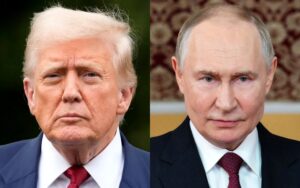Trump is terrorizing America?

Anyone who watched Donald Trump’s comments on autism on Monday could have recalled scenes and memories associated with the beginning of the Covid-19 pandemic, especially since the US president’s theories aren’t limited to unproven medical claims but extend beyond them to his own experience with health matters.
Trump’s recent statements carry strong echoes of his handling of Covid during his first term, when he once considered injecting disinfectant to combat the virus.
Five years later, the Republican president made claims that were equally astonishing.
He urged pregnant women not to take the painkiller Tylenol, noting that its risks are as high as those of vaccines.
“There’s a rumor, and I don’t know if it’s true or not, that Cuba doesn’t have Tylenol because it doesn’t have the money to buy it,” Trump said from the White House… “It also has virtually no autism”.
These may have been the most shocking allegations during the hour-long press conference, but they were not the only ones.
“The Amish, for example, do not suffer from autism at all,” he added, referring to the community known for its horse-drawn carriages and rejection of modern technology.
Turning to vaccine-skeptic Health and Human Services Secretary Robert Kennedy Jr., the president asked about the veracity of this claim, he said, “Bobby wants to be very careful about what he says. I’m not very careful about what I say”.
However, Trump, (79), admitted that his personal theories are just theories, even as he positioned himself as America’s physician-in-chief.
“It depends on how I feel,” he said, reiterating long-debunked concerns about the MMR vaccine, which combines measles, mumps, and rubella.
He called for increased spacing between childhood vaccines, which have been a cornerstone of public health programs worldwide for decades, before adding, “I’m not a doctor, but I’m giving my opinion”.
The billionaire and former reality TV star made his name by challenging conventional wisdom in politics and diplomacy, which contributed to his two presidential elections.
In the health field, his views have always been unacceptable among specialists.
During the Covid pandemic, Trump repeatedly resisted lockdowns and mask mandates while throwing his weight behind unproven drugs like hydroxychloroquine.
He was widely ridiculed when, during a White House Covid press conference in 2020, he offered some bizarre suggestions for treating the disease.
He then referred to the possibility of introducing “light into the body” and disinfectants.
“I think the disinfectant kills it (the virus) in a minute,” he told one expert, asking, “Is there a way we can do something similar by injecting it inside?”
During his second term, Trump’s selection of Kennedy as health secretary brought previously marginal ideas into the government.
The US president often expresses his concern about autism, as on Monday, he showed great confidence in his views on the issue, even when he struggled to pronounce “acetaminophen,” or paracetamol, the active ingredient in Tylenol.
“Don’t take it (the medicine),” he repeated.
He urged pregnant women suffering from pain to avoid the drug and bear it, but offered few answers about what to do if they develop a fever that could harm them or their babies.
Returning to the topic of vaccines, Trump confirmed his theories.
He stressed that children shouldn’t be vaccinated against hepatitis B until the age of 12, rather they should be vaccinated immediately after birth.
He said, “Hepatitis B is transmitted through sexual contact… There is no reason to give the vaccine to a newborn almost”.
The US president added that children are given “large amounts of fluids” while being vaccinated against potentially fatal diseases, reiterating a common anti-vaccine debate.
He noted that “they are pumping so much stuff into these beautiful little kids, it’s a shame, it’s like they’re pumping into a horse”.








